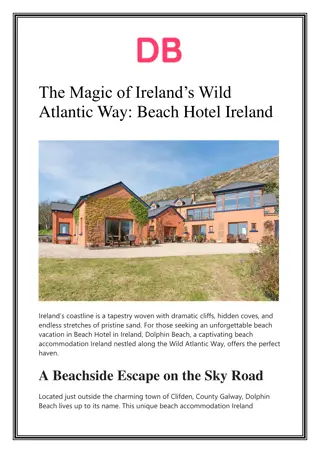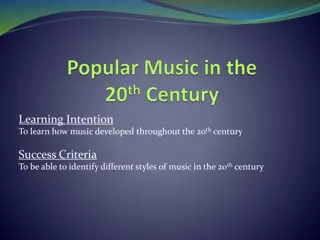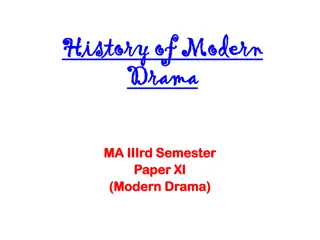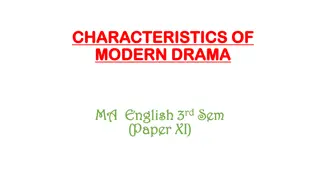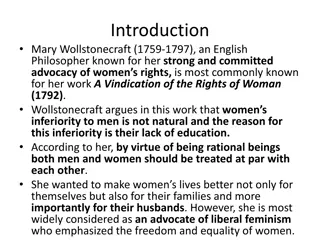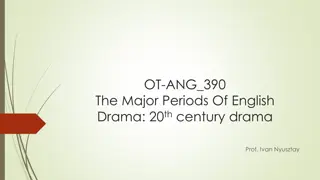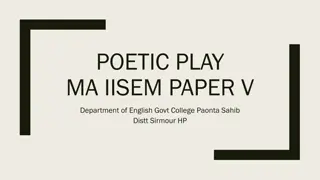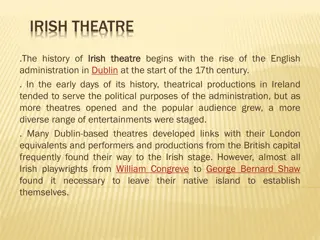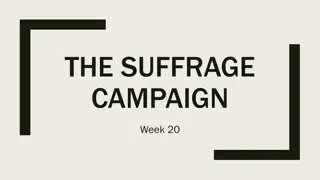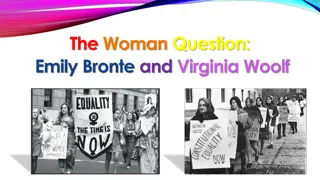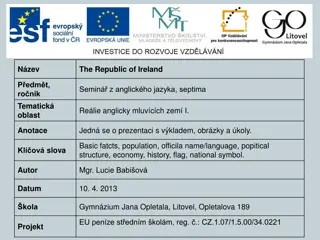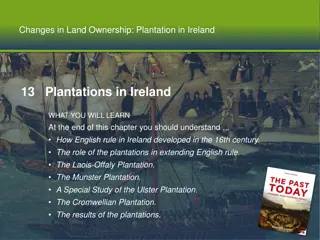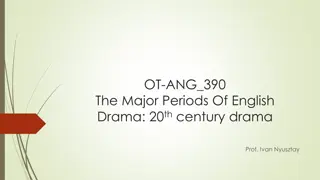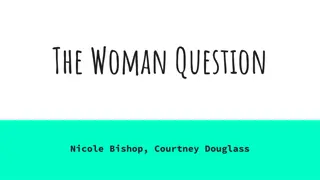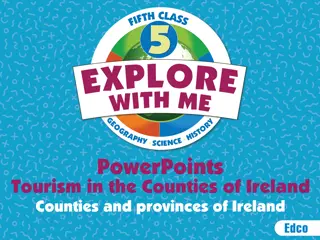Evolution of Women in 20th-Century Ireland: A Historical Perspective
The changing experience of women in 20th-century Ireland reflects a journey from second-class citizenship to increased participation in workforce and education. From being primarily homemakers, women transitioned to holding jobs in offices, teaching, nursing, and civil service. However, gender pay gaps persist in management positions. The narrative also highlights the progress made in women's education and their emerging roles in politics.
Download Presentation

Please find below an Image/Link to download the presentation.
The content on the website is provided AS IS for your information and personal use only. It may not be sold, licensed, or shared on other websites without obtaining consent from the author.If you encounter any issues during the download, it is possible that the publisher has removed the file from their server.
You are allowed to download the files provided on this website for personal or commercial use, subject to the condition that they are used lawfully. All files are the property of their respective owners.
The content on the website is provided AS IS for your information and personal use only. It may not be sold, licensed, or shared on other websites without obtaining consent from the author.
E N D
Presentation Transcript
23 THE CHANGING EXPERIENCE OF WOMEN IN TWENTIETH-CENTURY IRELAND The Changing Experience of Women in Twentieth-Century Ireland 37 Chapter 23
23 THE CHANGING EXPERIENCE OF WOMEN IN TWENTIETH-CENTURY IRELAND What Will I Learn? Explain how the experience of women in Irish society changed during the 20th century Explore the Nature of History
23 THE CHANGING EXPERIENCE OF WOMEN IN TWENTIETH-CENTURY IRELAND Women in Early Twentieth-Century Ireland Women as second-class citizens
23 THE CHANGING EXPERIENCE OF WOMEN IN TWENTIETH-CENTURY IRELAND Women at Work Early 20th century Married women Better-off women Poorer women Dublin Belfast Women in rural areas Single women 1971 1981 1991 1997 After independence Similar pattern Mostly unskilled, lower-paid jobs Higher emigration rate for women Female labour force as % of total labour force 25.7 29.1 32.7 37.0 Married women in the labour force as % of total women in the labour force 13.6 30.3 40.8 52.7
23 THE CHANGING EXPERIENCE OF WOMEN IN TWENTIETH-CENTURY IRELAND Women at Work Changes from 1960s onwards More women work outside the home Married women held onto jobs New jobs in offices, teaching, nursing and civil service Limit size of families Many women worked part-time Smaller proportion of women managers and senior executives
23 THE CHANGING EXPERIENCE OF WOMEN IN TWENTIETH-CENTURY IRELAND Women in management positions in Ireland earn 16% less than men, according to new research by Europe s statistical agency Eurostat. The study also found that the average pay gap across the EU is 23%. In Ireland, two out of every five managers are women, according to Eurostat. That places Ireland s performance in terms of gender equality in management ranks ahead of France, Sweden and the UK. However, male managers are paid 16% more than females in management roles in Ireland. The percentage gap between male and female pay (gender pay gap) in EU Member States, 2015)
23 THE CHANGING EXPERIENCE OF WOMEN IN TWENTIETH-CENTURY IRELAND Women in Education Limited education in early 20th century Major change from 1960s onwards More women in education Opened up new careers
23 THE CHANGING EXPERIENCE OF WOMEN IN TWENTIETH-CENTURY IRELAND Women and Politics Votes for women Women could not vote Could not be elected to parliament Suffragette campaign Hanna Sheehy-Skeffington founded Irish Women s Franchise League Opposed by Redmond and Carson Hanna Sheehy-Skeffington Influence of World War I on votes for women See Skills Book p. 203 Women over 30 got the vote in 1918
23 THE CHANGING EXPERIENCE OF WOMEN IN TWENTIETH-CENTURY IRELAND Women and Politics Women in the independence movement Women play important role in independence movement Countess Markievicz first woman elected to parliament but did not take seat After independence, women over 21 got the vote Countess Markievicz Elizabeth O Farrell
23 THE CHANGING EXPERIENCE OF WOMEN IN TWENTIETH-CENTURY IRELAND A Conservative Society A woman s place was in the home Divorce and contraception banned Women not allowed to sit on juries Marriage bar women gave up civil and public service jobs when they married Irish Constitution, 1937 women within the home See Skills Book p. 207
23 THE CHANGING EXPERIENCE OF WOMEN IN TWENTIETH-CENTURY IRELAND The 1960s Onwards How did Women s Lives Change?
23 THE CHANGING EXPERIENCE OF WOMEN IN TWENTIETH-CENTURY IRELAND Timeline of changes 1958 Ban on married primary teachers lifted 1970 Commission on the Status of Women set up Women s Liberation Movement founded in Ireland 1973 Ireland joined EEC (European Economic Community) (later EU) Women in the public service no longer lose their jobs when they marry Social welfare allowances for single mothers 1974 Anti-Discrimination (Pay) Act 1975 Men and women equally eligible for jury service 1976 EEC compelled Irish government to implement equal pay for women 1977 Employment Equality Act: unlawful to discriminate on grounds of sex or marital status 1979 Contraception allowed for married couples over 18 1996 Divorce referendum passed 2000 Equal Status Act prohibits discrimination
23 THE CHANGING EXPERIENCE OF WOMEN IN TWENTIETH-CENTURY IRELAND The Irish Women s Liberation Movement Source 1 A publication of the Irish Women s Liberation Movement (1971) Source 2 Members of the Irish Women s Liberation Movement
23 THE CHANGING EXPERIENCE OF WOMEN IN TWENTIETH-CENTURY IRELAND The Irish Women s Liberation Movement Source 4 Equal Rights for Irish Women! Do you think it s just that for every 26p (5s 3d) that a woman earns, her male counterpart gets 47p (9s 6d)? Do you think its just that The Civil Service and all State Bodies, including Radio Telef s ireann, sack women upon marriage? Do you know that a mother is not permitted to sign a children s allowance receipt without her husband s permission? Irish Women s Liberation Movement, Chains Source 3 Article 40 of the Irish Constitution promises equal rights to all citizens of the Republic of Ireland. 1,434,970 Irish citizens (at the last count) are not given such rights. These are the women of Ireland. A married woman in Ireland is regarded as the chattel (property) of her husband. She must have permission from him for all kinds of things (Irish Women s Liberation Movement, Chains or Change, [1971]) or Change, [1971]) See Skills Book p. 207
23 THE CHANGING EXPERIENCE OF WOMEN IN TWENTIETH-CENTURY IRELAND Women in Politics the South Women in Irish general election by decade Candidates Elected Year Total number Women candidates Women as % Total number Women candidates Women as % 1923 377 7 1.9 153 5 3.3 1933 246 6 2.4 153 3 1.9 1943 354 9 2.5 138 3 2.2 1954 303 6 1.9 147 5 3.4 1969 373 11 2.9 144 3 2.1 1977 375 25 6.6 148 6 4.1 1982 365 31 8.5 166 14 8.4 1989 371 53 13.8 166 13 7.8 Total 2764 148 5.3 1215 52 4.2
23 THE CHANGING EXPERIENCE OF WOMEN IN TWENTIETH-CENTURY IRELAND Mary Harney, former T naiste Gemma Hussey, Minister for Education Mary McAleese, former President Mary Robinson, former President
23 THE CHANGING EXPERIENCE OF WOMEN IN TWENTIETH-CENTURY IRELAND State Year % Female Belgium 1995 15.3 Women in Politics the South Denmark 1994 33.0 Germany 1994 25.7 Greece 1993 5.3 Spain 1993 14.6 France 1993/9 2 5.6 Proportion of women in the national parliaments of the European Union member states Ireland 1997/9 2 12.4 Italy 1994 12.0 Luxembourg 1994 16.6 Netherlands 1994/9 5 30.2 Austria 1994 22.7 Portugal 1991 8.7 How does Ireland compare with other states in the EU? Finland 1995 33.5 Sweden 1994 40.4 UK 1992 7.4 Average 14.8
23 THE CHANGING EXPERIENCE OF WOMEN IN TWENTIETH-CENTURY IRELAND Women in Politics the North Civil rights in NI in 1960s Homeless Citizens League Campaign for Social Justice NICRA People s Democracy march Patricia McCluskey, civil rights activist Bernadette Devlin, civil rights activist The Troubles Price sisters Peace People Thus the founding of the Northern Ireland Civil Rights Association (NICRA) is as much the result of their [women s] groundwork as of the various trade union, republican and civil liberties groups that joined in establishing the organisation in April 1967. (Catherine Shannon)
23 THE CHANGING EXPERIENCE OF WOMEN IN TWENTIETH-CENTURY IRELAND Successful sportswomen Katie Taylor, boxer Sonia O Sullivan, athlete Angela Downey, camogie player
23 THE CHANGING EXPERIENCE OF WOMEN IN TWENTIETH-CENTURY IRELAND Problems Life for Women in the Early 20th Century Vs Late 20th Century Role in advertising Traditional male clubs Break-up of marriages Gender pay gap Management gap See Skills Book pp. 203 and 209
23 THE CHANGING EXPERIENCE OF WOMEN IN TWENTIETH-CENTURY IRELAND
23 THE CHANGING EXPERIENCE OF WOMEN IN TWENTIETH-CENTURY IRELAND
23 THE CHANGING EXPERIENCE OF WOMEN IN TWENTIETH-CENTURY IRELAND




